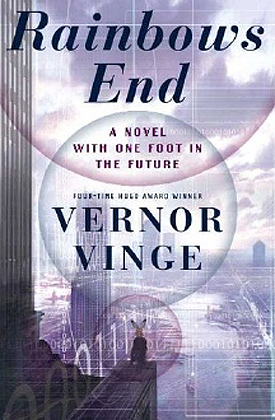 I’m not sure that Vernor Vinge’s Rainbows End counts as cyberpunk, although it might seem like it at first glance. The “cyber” part is there in full measure. Vinge envisions a world in the not-so-distant future in which clothes are the means of Internet access and most of “reality” is virtual. The “punk” part is somewhat lacking, however: this is, by and large, a supremely middle-class novel, without the dark-edge, seamy underbelly feeling one gets from a William Gibson. The action, or most of it, takes place in and around the University of California at San Diego, and involves a typical American family (assuming you consider a household composed of two high-level military operatives, their precocious eleven-year-old daughter, and a world-renowned poet as “typical.”), plus some top-echelon spook masters and a virtual take-off on Bugs Bunny.
I’m not sure that Vernor Vinge’s Rainbows End counts as cyberpunk, although it might seem like it at first glance. The “cyber” part is there in full measure. Vinge envisions a world in the not-so-distant future in which clothes are the means of Internet access and most of “reality” is virtual. The “punk” part is somewhat lacking, however: this is, by and large, a supremely middle-class novel, without the dark-edge, seamy underbelly feeling one gets from a William Gibson. The action, or most of it, takes place in and around the University of California at San Diego, and involves a typical American family (assuming you consider a household composed of two high-level military operatives, their precocious eleven-year-old daughter, and a world-renowned poet as “typical.”), plus some top-echelon spook masters and a virtual take-off on Bugs Bunny.
Alfred Vaz heads up a department in India’s External Intelligence Agency that not many people know about. One of those is Gü:nberk Braun of European Intelligence, who brings to Vaz and their colleague from Japanese Intelligence, Keiko Misturi, some anomalous data that show a frightening possibility. (In case you were wondering, Europe, India and Japan are all members of the Indo-European Alliance, which is one of the three Great Powers along with North America and China.) It appears that someone is dangerously close to YGBM (“You Gotta Believe Me”) technology, with huge potential for a collapse of world stability. Vaz has contacted a free-lance troubleshooter known as “Mr. Rabbit” to infiltrate the research labs involved and shut down the project. Needless to say, Vaz, who has more irons in the fire than anyone knows, is not telling everyone everything.
Robert Gu was a world-renowned poet who has been brought back from Alzheimer’s and physical senility through modern medicine and a good deal of luck — fortunately for him, most of what ailed him were things that there are now cures for. He now lives with his son Bob and daughter-in-law Alice, both Marines who spend a good amount of time on missions they can’t talk about, and their daughter Miri. It’s soon obvious that Robert Gu, in addition to his other gifts, was blessed with all the characteristics of a first-class manipulative, misanthropic s.o.b. He hasn’t changed much, except that he appears to have lost the one thing that set him apart from millions of other s.o.b.s — he can’t write poetry any more. He does, however, manage to get sucked into Vaz’ plots, perhaps by Rabbit, perhaps by Vaz himself, because they offer him the one thing he wants: his ability to write.
Vinge has turned all of this into a fascinating thriller, although the fascination is sometimes more for the detailed and solidly constructed universe than the action itself — there are some distinct problems in pacing. Such reservations aside, however, the universe Vinge presents is not only wildly inventive but grows organically out of current trends, technological, political and social. This is classic science fiction at near the top level, at times edge-of-the-seat tense but also leavened with raucously out of control scenarios.
I have to say, though, that the climax was not completely satisfying. While the change in Robert’s outlook, as he finally grasps something that everyone around him already knew, is believable and rewarding, I personally would have like to have had a more definitive resolution of Alfred Vaz’ fate. One can guess, but there’s really no sense of closure. The climax itself, which involves a campus demonstration gotten completely out of hand (Berkeley in the ’60s isn’t even in the running), is hampered by having to jump among various viewpoints, with disastrous results for pacing. I didn’t, however, put the book down — I just squirmed a little.
In spite of my reservations, Rainbows End is another fascinating contribution to the growing literature that deals with how information exchange defines culture, based on things we can see around us. It also, in spite of its middle-class setting — or perhaps because of it — brings home some of the frightening possibilities of the information explosion.
(Tom Doherty Associates, 2006)
